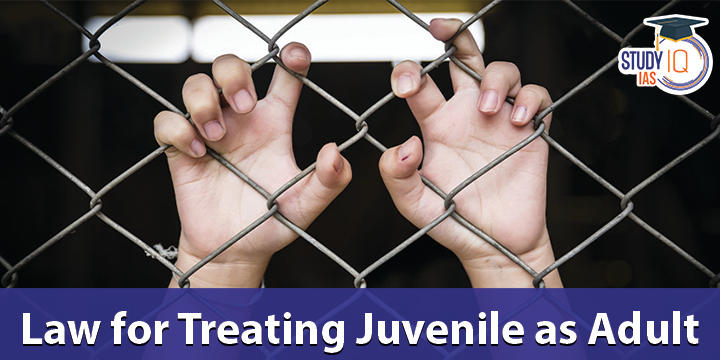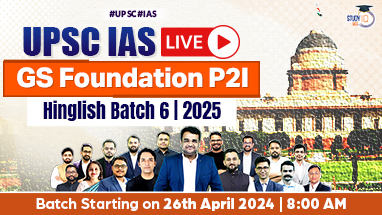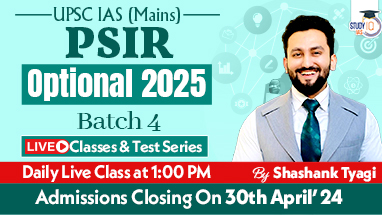Table of Contents
Juvenile Tried as Adult Cases India
- In September 2017, a Class 2 student at a prominent school in Gurugram was found murdered inside the school washroom. The accused was a 16-year-old student at the time of committing the offence.
- In December 2017, the JJB decided to treat the accused as an adult. But the JJB’s order was scrapped by the Punjab and Haryana high court and then by the Supreme Court earlier this year.
- The Supreme Court, which found procedural lapses in the JJB’s proceedings, had left it to the board to decide if a psychological evaluation would be relevant at this point of time.
- After the reassessment, the JJB ordered for treating the accused juvenile as an adult.
When can a Juvenile Tried as Adult
- According to Section 15 of The Juvenile Justice (Care and Protection of Children) Act, 2015 (JJ Act, 2015), juveniles charged with heinous crimes and who are between the ages of 16 to 18 years can be tried as adults.
- Under the 2015 Act, the crimes categorized as heinous, serious and petty are:
- Heinous crime: If attracts minimum penalty of 7 years imprisonment under any existing law.
- Serious crime: If imprisonment between 3 to 7 years is given.
- Petty crime: If penalized up to 3 years of imprisonment.
- Under the 2015 Act, the crimes categorized as heinous, serious and petty are:
- Age on the date of the offence: For a Child in Conflict with Law (CCL) to be tried as an adult, age on the date of the offence decides whether the accused was an adult or a child.
- Criteria: The Act sets three criteria before the Juvenile Justice Board (JJB) can decide to treat accused as adults:
- Mental and physical capacity;
- Ability to understand consequences; and
- The circumstances of the offence.
- The procedure:
- Prior to deciding if the child should be tried as an adult, the JJB must conduct a preliminary assessment based on the above criteria.
- The assessment is required to be done within three months from the date of first production of the child before the JJB.
- In this regard, the Supreme Court held that when the JJB does not comprise a practicing professional with a degree in child psychology or child psychiatry, it would have to mandatorily seek the assistance of experts.
Juvenile Tried as Adult: Ordered to be Treated as an Adult?
What happens when a juvenile is ordered to be treated as an adult?
- As soon as the JJB decides in favour of treating a juvenile as an adult, the case is transferred to the children’s court.
- As per Section 19 of the JJ Act, 2015, the children’s court can pass a decision on whether there is a need for trial of the child as an adult, or otherwise.
- A children’s court has to ensure that the child in conflict with the law is sent to a “place of safety” until he reaches the age of 21 years, and is only then transferred to jail.
- The court can also order the conditional release of the child after he attains the age of 21 years.
- Two important protections that do not extend to a child who has been tried as an adult:
- Protection from disqualification
- Erasure of conviction record after a reasonable period
- If the child is tried as an adult, the sentence can go up to life imprisonment, but if the child is tried by the board as a juvenile, the maximum sentence can only be three years in a special home.
Juvenile Tried as Adult: Juvenile Justice (Care and Protection of Children Act) 2015
- About
- It was introduced and passed in Parliament in 2015 to replace the Juvenile Delinquency Law and the Juvenile Justice (Care and Protection of Children Act) 2000.
- The Act seeks to achieve the objectives of the United Nations Convention on the Rights of Children as ratified by India on December 11, 1992.
- Background
- The Act was passed after the brutal gang rape and murder of a student in Delhi in December 2012. One of the six accused in the case was 17.
- Following the crime, the Ministry of Child and Development proposed changes to the law to punish juvenile offenders, citing an increase in cases of offenders in that group.
- Important provisions
- It has allowed the trial of juveniles in conflict with the law in the age group of 16-18 years as adults, in cases where the crimes were to be determined.
- The nature of the crime, and whether the juvenile should be tried as a minor or a child, was to be determined by a Juvenile Justice Board.
- The Act streamlined adoption procedures for orphans abandoned and surrendered children.
- The act had introduced foster care in India.
- The existing Central Adoption Resource Authority (CARA) has been given the status of a statutory body to enable it to perform its function more effectively.
- The law had also made provision that while adopting a child, priority is given to disabled children and physically and financially incapable children.
- Special provisions have been made to tackle child offenders committing heinous offences in the age group of 16-18 years.
- The Juvenile Justice Board is given the option to transfer cases of heinous offences by such children to a Children’s Court (Court of Session) after conducting the preliminary assessment.
What are Juvenile Justice Boards
- About: Juveniles accused of a crime or detained for a crime are brought before the Juvenile Justice Board (JJB) under the Juvenile Justice (Care and Protection of Children) Act, 2015.
- Aim: To hold a child culpable for their criminal activity, not through punishment, but counselling the child to understand their actions and persuade them away from criminal activities in the future.
- Structure: The JJB consists of judicial magistrate of the first class and two social workers, at least one of whom should be a woman.
- Tenure: The tenure period for members of the board is 3 years. However, members can also be appointed consecutively for a maximum of two terms.
- Powers: The Bench shall have all the powers conferred by the Code of Criminal Procedure, 1973 on a Metropolitan Magistrate or a Judicial Magistrate First Class.
- Training for the Members: The onus of sensitizing and providing training to all the Board Members lies on the State Government.


 Current Affairs 19th April 2024 for UPSC...
Current Affairs 19th April 2024 for UPSC...
 Private investment, Trend in India, and ...
Private investment, Trend in India, and ...
 Maoist Insurgency, Current Scenario and ...
Maoist Insurgency, Current Scenario and ...

















